Alexandr Vinokourov - Staying power, Mark Cavendish and finishing careers the right way
The Kazakh manager discusses the race where he took on new Astana Qazaqstan rider Cavendish - and won
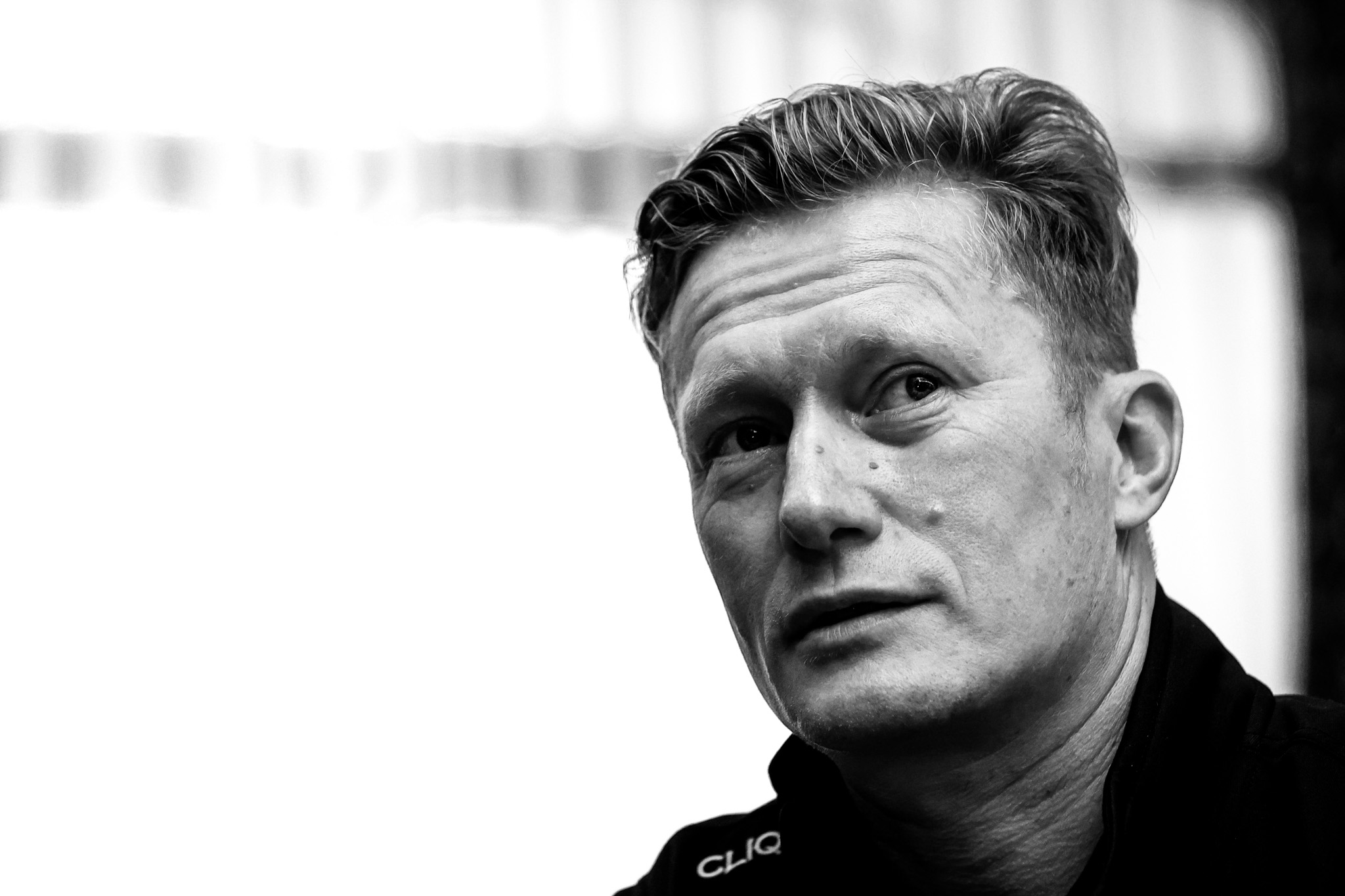

It has been just over a decade since Alexandr Vinokourov managed to take the biggest win of his career. But he has been back to where it all happened more than once - almost as if it was so important, he still needs to be sure it was real.
“I’ve been over to London with my kids a few times since,” the Astana Qazaqstan manager tells Cyclingnews, “and I went down to Buckingham Palace to see if the finish line from the Olympic Games was still painted in the road. Even though I’ll always know in my head where it was."
Yet even if the finish line from the 2012 elite men’s road race that opened up proceedings for London’s Olympics has surely been tarmacked over a long while back, Vinokourov’s gold medal for Kazakhstan ahead of Rigoberto Urán nonetheless remains the point which marked the closing of the chapter of his life as a racer.
“It was,” he concludes in his typical soft-spoken voice, “a great way to end my career.” And simultaneously, that win on The Mall also opened up the next decade of his working as the team manager of the Astana Qazaqstan squad, all the way through to the present day.
As lines in his personal history go, the one drawn in The Mall carries a massive extra significance. But for Astana the team, the point where Vinokourov was definitively promoted to his current role of general manager was equally critical.
Vinokourov has been instrumental in keeping the squad both as a showcase for Kazakhstan’s up-and-coming riders – the latest being current under-23 World Champion Yevgeniy Fedorov – and for other top international names to race at the highest level. The WorldTour team is one of just four to have secured a Tour de France overall win since 2012, and have won two Giros d’Italia, all with the recently retired Vincenzo Nibali.
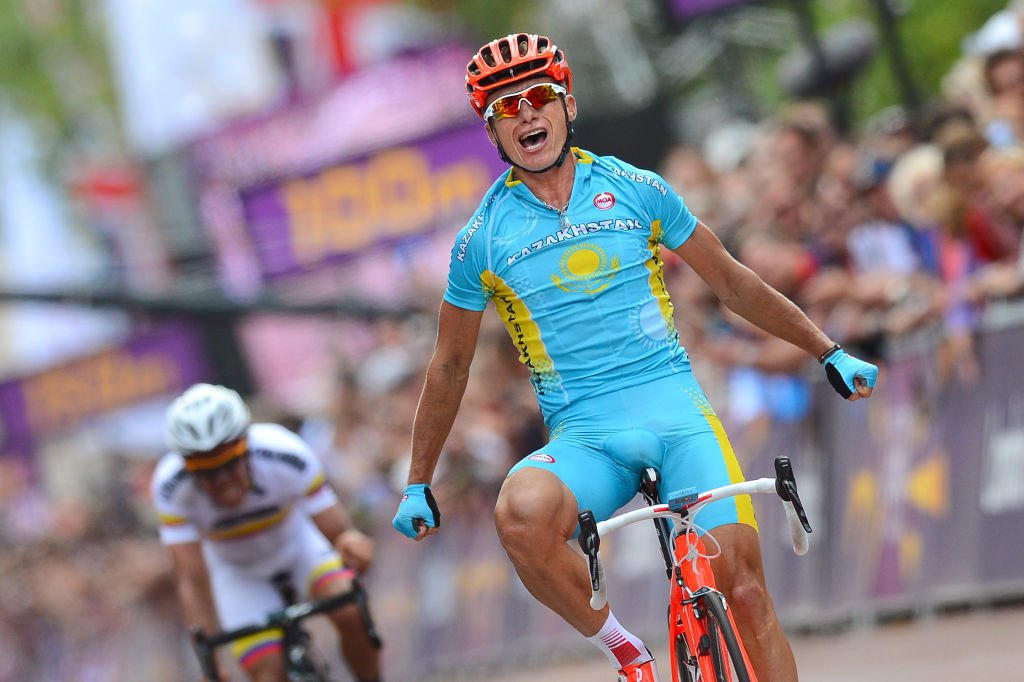
The Mall was also curiously enough probably the closest point in Vinokourov’s professional career where he, as an all-rounder, was directly or indirectly racing against the team’s new signing, sprinter Mark Cavendish.
Get The Leadout Newsletter
The latest race content, interviews, features, reviews and expert buying guides, direct to your inbox!
In London in 2012, the Briton was the key local favourite for Olympic gold but an overly ambitious and publicly-aired pre-race British team strategy drained Cavendish of vital squad support. The widely predicted bunch sprint outcome was turned on its head when Vinokourov leapt ahead in a breakaway. In the finale, he bamboozled Rigoberto Uran in the two-up sprint for gold.
Cavendish, meanwhile, came home an anonymous 29th, as Vinokourov joked to Cyclingnews when revealing he had spoken to the Briton about joining Astana Qazaqstan, “Maybe I was the one who stopped him getting a ‘Sir.”
But while he is confident that the two can work together to bring both the UK and Astana Qazaqstan a historic 35th stage win in the Tour de France and beat Eddy Merckx's all-time record, Vinokourov also knows about the importance of ending a career on a high note, as Cavendish doubtless would if he triumphs this summer.
In 2011, Vinokourov had crashed in the Tour de France, breaking his femur. His career had seemingly come to an end. But a year later he fought back to the top of his sport in London, just as Cavendish, after more than his own fair share of setbacks, might now do in Astana Qazaqstan.
“I had a contract for two years and I knew it was a pity to finish my career like that with a crash, so I said to myself, it’s another year, keep going,” Vinokourov tells Cyclingnews.
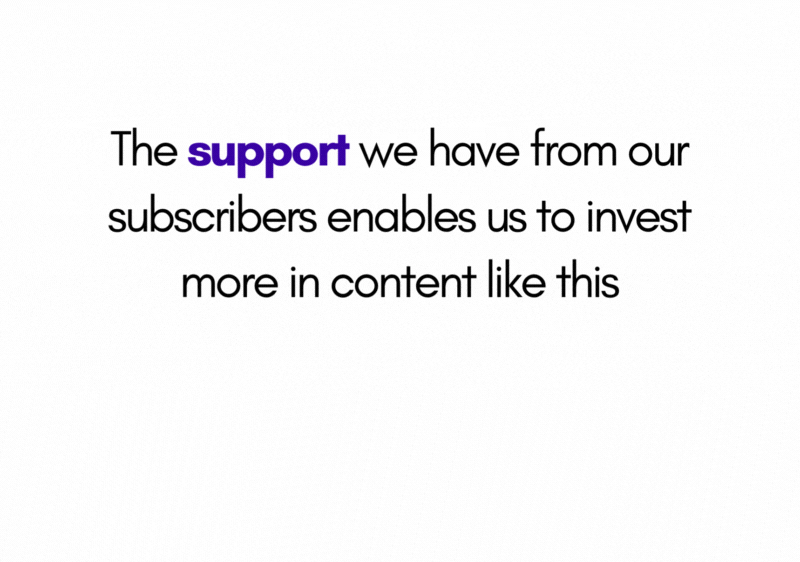
“There were a lot of people who said no, you’ve already done all you had to do. I said, 'no, there’s time for me to do another year' although even before the start in London I wasn’t sure I was at 100%.”
“But I said to myself, Alex, you’re young, you’ve been National Champion. Don’t give up. A the start of 2012, I'd done some small races like the Tour of Turkey and Tour de Langkawi, it had been really tough but I’d got through that.
“And then at the Games, my legs got better and better and I got into a small break in London and I said, even third or fourth would be a great result.
“Afterwards, when I look back on it, that end of my career was the best way to go out. I couldn't ask for more.”
Yet if on that hot day in July 2012, Vinokourov could have been what stopped Cavendish from getting a knighthood, (and who knows if the opposite could prove true in the Tour this summer) it’s not only the top names with which Vinokourov has had notable success as a manager.
As one veteran Astana rider, Luis León Sanchez, tells Cyclingnews, “when Vino’ was demoted from team manager last year” – for a few months when Astana began a brief, ill-fated sponsorship deal with Canadian company Premier Tech that ended with Vinokourov’s reinstatement - “lots of riders decided to leave the team, including me.

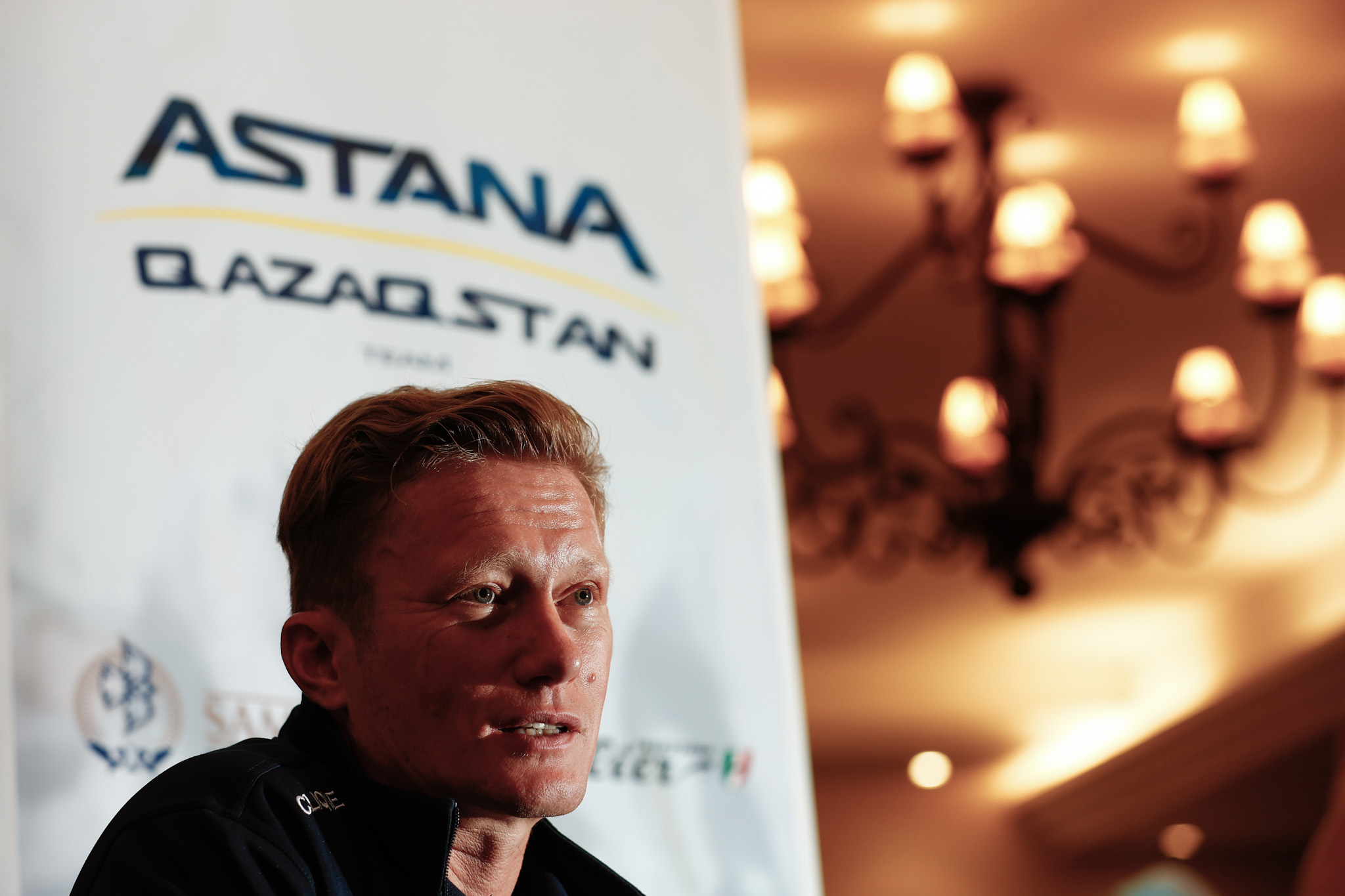
“It was only when I knew he was back on board that I opted to leave Bahrain to come back.”
Indeed, tellingly, after several seasons at Bahrain and then Trek-Segafredo, Nibali himself returned to Astana for a final year in 2022, before retiring.
It’s notable how many riders Cyclingnews speak to who confirm that Vinokourov and Astana are, in cycling terms, joined from the hip down. Their fortunes have been inextricably linked even before the title sponsor, a conglomerate of state-owned companies from Kazakhstan that effectively operate as an international brand, took over from the near-defunct Liberty Seguros squad mid-way through 2006, which Vinokourov was leading at the time.
Astana rescued the team amid the Operacion Puerto scandal when Liberty pulled out. They ousted former manager Manolo Saiz, the first arrest in the Spanish doping investigation. The team were forced to leave the 2006 Tour de France after five of the squad (but not Vinokourov) were named in the case.
Vinokourov tested positive for a homologous blood transfusion during the 2007 Tour de France after winning two stages in three days. The team were banned from the 2008 Tour, preventing Alberto Contador from defending his title.
But while the setbacks and the controversies could have been a death knell for other teams, the most striking element of Vinokourov and the Astana Qazaqstan squad is its longevity in the sport. Regardless of the stones in the road, the controversies and the setbacks, when placed against the moments of triumph, for nearly two decades the team’s backers clearly feel that the game is worth the candle.
“One of the most established and successful UCI WorldTeams in professional cycling is going to start its 18th season,” the team’s website trumpets. Even getting a Tweet from Lance Armstrong saying “Vinokourov still around and managing. WTF”
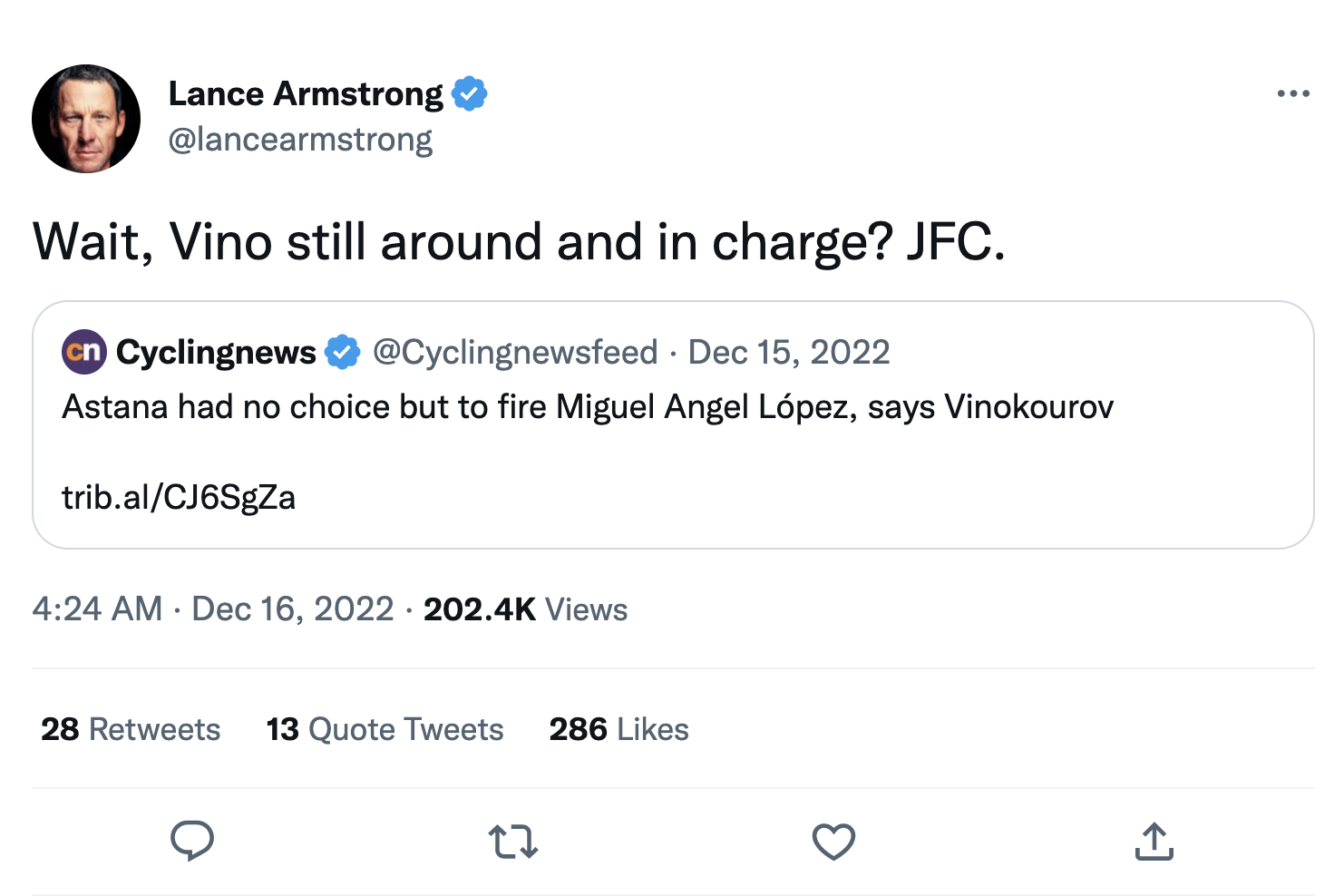
You could call that a backhanded compliment, sounding almost like grudging admiration from the Texan that others have played the game of survival on cycling’s professional circuit even better than he has. Even after a 2022 season that Vinokourov has no qualms in describing as one of the poorest in its history, he agrees that being able to count on such lengthy support through thick and thin is no minor matter.
“AG2R, FDJ, Lotto…us, that’s not many, sponsors out there,” he says. “As I very clearly told the new president of the country [Kassym-Jomart Tokayev, in power since 2019 – Ed.] in a meeting I had with him, Astana Qazaqstan is a huge project for our country.
“Of course, that costs money, and I told him we needed an increase in the budget because these days cycling is very expensive.
“We’d got stuck with a budget from around 2015 and our rivals had moved ahead. That wasn’t effective. But it’s confirmed now we’re moving ahead. He agreed that it was great for the country’s image, he thinks we’re a great brand worldwide.”
If it says a lot about Vinokourov’s near-iconic status in Kazakhstan that he has had the ear of the most recent presidents when it comes to asking for more economic backing. The latest big-budget signing has, of course, been Cavendish. But before that, Astana’s post-2012 outlay included such star names as Nibali, the late Michele Scarponi, top Danish allrounder Jakob Fuglsang and the ill-starred Miguel Angel López.
When he discusses how Nibali came back to Astana for his final year, the pleasure in Vinokourov's voice, for all he is quietly spoken and seemingly the mildest mannered of people, is impossible to miss.

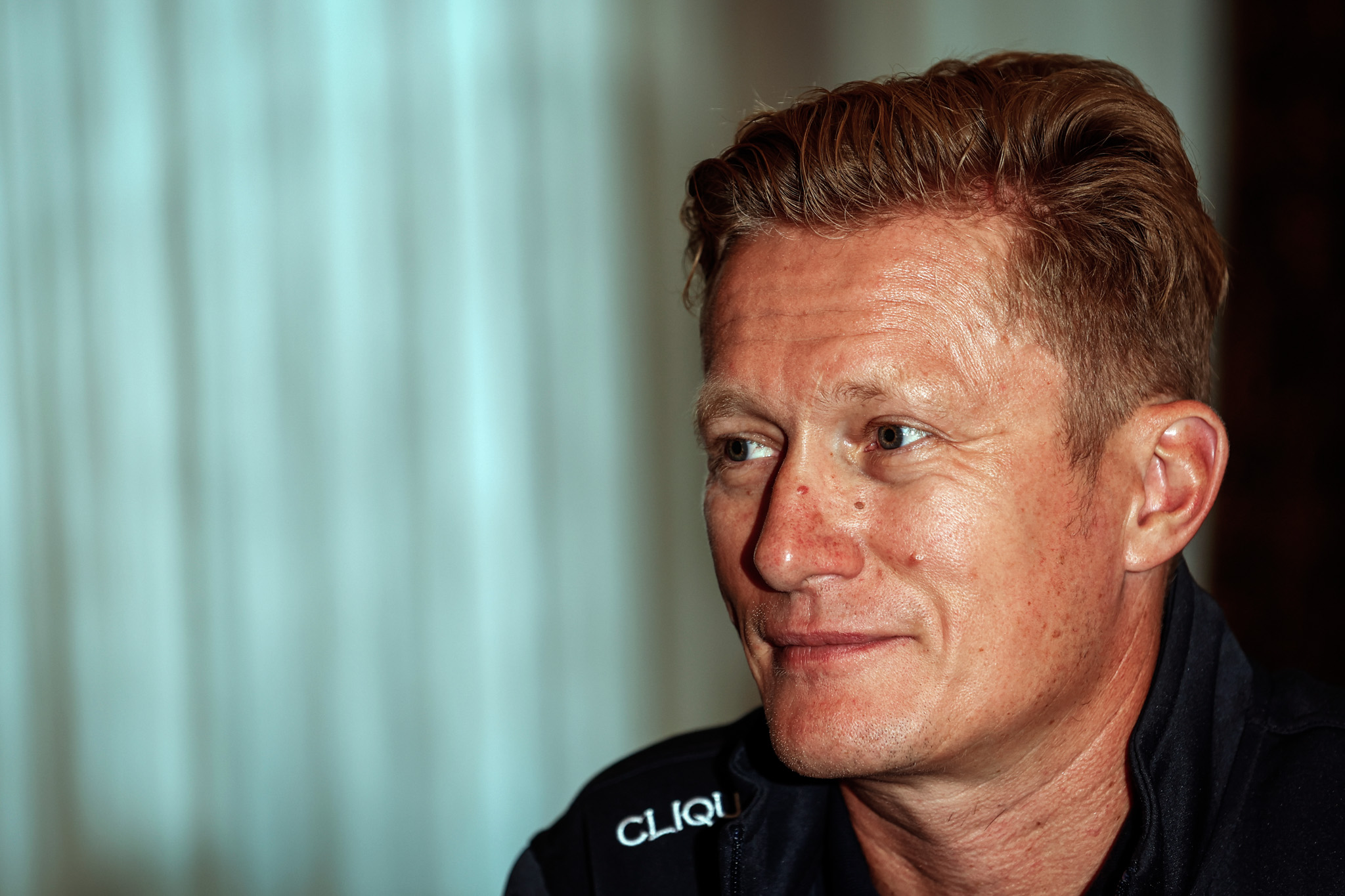
“Nibali did some great races with us, winning the Tour and the Giro twice and he got second in the Vuelta in 2013, when Chris Horner won it, but they had a great battle on the Angliru, too.
“He maybe lacked a stage win in the Giro or the Vuelta with us this year [2022], he was close in Turin but I think he was too motivated. But when you’re too keen, sometimes you make mistakes. Still, getting fourth in the Giro with all of Italy behind him, that was a great way to go. So no doubt about it, it was wonderful how he wanted to finish the career with us, in the family.”
There is no question, as Vinokourov recognises, that Astana Qazaqstan are in dire need of a good season in 2023. Nibali’s presence in the squad was one of the few high points in a year when the team took no World Tour wins.
“This year was one of our worst, even when I fell in 2011 and it went so badly, we got a few wins. But we lacked results, even if we got fourth in the Giro and Vuelta [the latter with López – Ed.], at the end of the day who remembers that?”

Vinokourov agrees that his star Kazakh rider Alexey Lutsenko was “good” – he placed eighth in the Tour, but only took one minor early season win – “but overall it was not a positive year. We had illnesses as well but we hope that it was just one season and that we can turn things around.”
Cavendish apart, he has high hopes that Lutsenko, a sometimes erratic performer, can make his mark in 2023, but equally under-23 World Champion Yevgeni Federov is another rider to watch.
Focussing on the young riders is not just about those in the current team, either. Astana’s development team, where Fedorov raced, has plenty of other up-and-coming names, including Vinokourov’s own twin sons, Alexander and Nico.
“It’s going well, we’ve got 12 riders, a Spaniard, an Italian, and six Kazakhs. Alex and Nico are doing fine, though they’ve got to finish their exams as well and I insist on that.
“They want to succeed, and I’m not going to push them too hard. It’d be hard for them to do better than their Dad, anyway, but the most important thing is that they do their best.
“There are plenty of young riders out there making their mark like Ayuso, Tadej Pogačar, Remco… we can’t have them, we have to wait and work with others.”
“We’ve got guys like De La Cruz who can show their potential, some good Italian racers as well. Having Luis León back is a big plus, of course. I don’t want to put a number on it in terms of wins though: basically, if we do better than 2022, that’s already something.”
Nor is it all about the Tour, Vinokourov points to the postponed 2022 Asian Games, now due to take place in 2023, as another huge target.
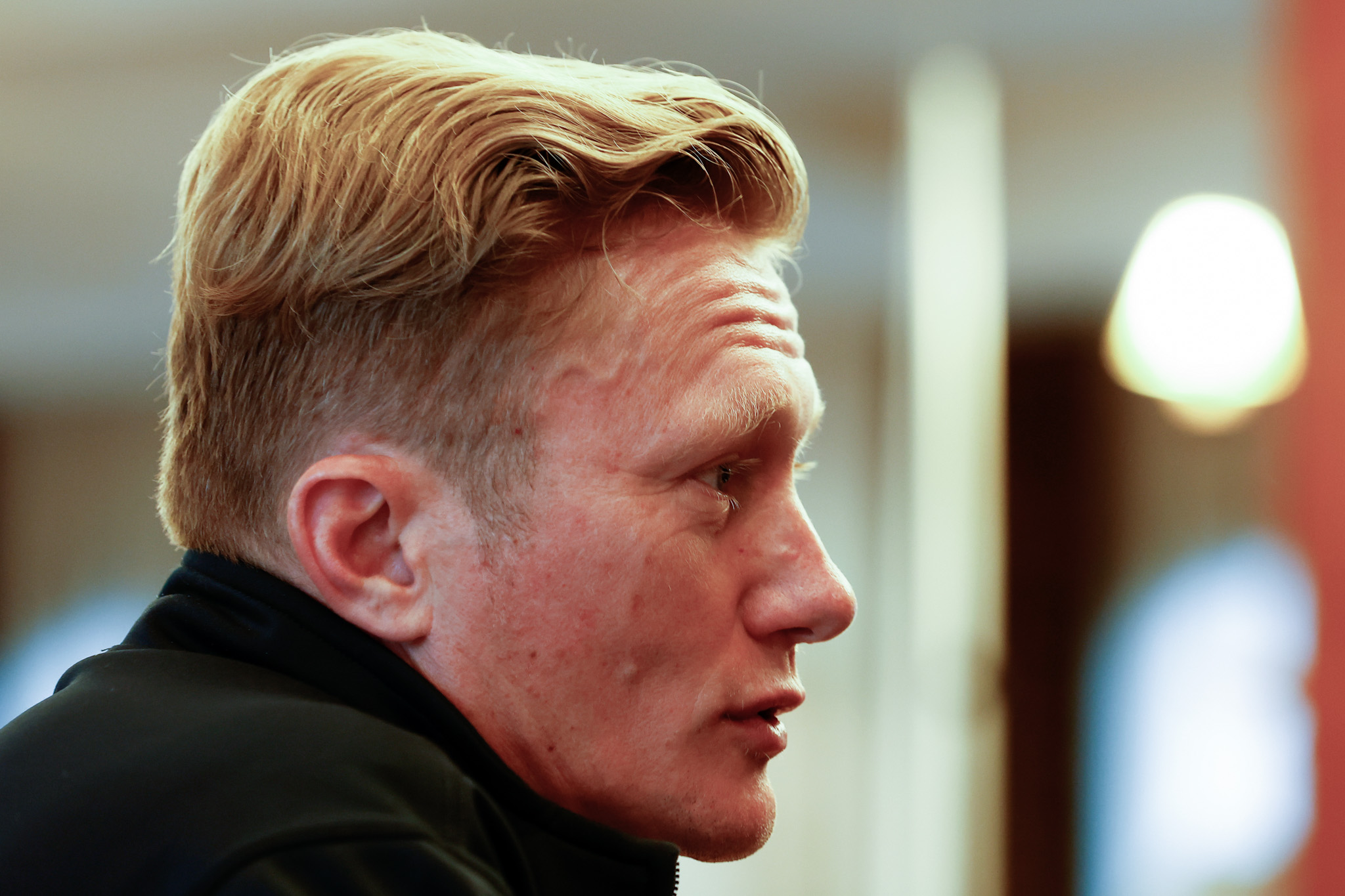
Cavendish’s presence is sure to generate massive media interest in the team and his outspoken and charismatic personality may be timely in other ways for Astana Qazaqstan. Vinokourov says some fans think both he and the Kazakh squad are “overly serious”, but insists that “once you get to know us, you’ll see we’re friendly. A Belgian doctor who’s just joined the squad told me he had got the idea that we weren’t that approachable, but that’s not the case. We’re tough, but we’re open.”
When asked, Vinokourov is equally willing to open up about himself, revealing proudly he has done various triathlons along with former pro Laurent Jalabert, likes a spot of fishing now and that “I do a lot of hunting back in Kazakhstan, mainly wild boar." He then plays down the challenges of that particular activity by saying “following them [the boars] in the snow is easy."
Regardless of the dubious appeal of killing wild animals for sport, Vinokourov doesn't sound like somebody who really spends much time away from cycling. "Even when it’s the off-season, at management level, I can disconnect a bit, but when the season's over, it’s never really over," he adds a shade glumly. "Really, it's hard to gain distance.”
Then again, it’s hard to know if Vinokourov would really want to disconnect or put distance between himself and a team that has formed so much of his life up to now, and in which he has clearly invested so much personally.
As he puts it, “I don’t know if you could say that next year and what happens [with Mark Cavendish] would be another chapter of this squad. But I do know that at this point in my life already when it comes to this team - I could write a whole book.”
What’s in a Cyclingnews subscription? We use our subscription fees to be able to keep producing all our usual great content as well as more premium pieces like this one. Find out more here.

Alasdair Fotheringham has been reporting on cycling since 1991. He has covered every Tour de France since 1992 bar one, as well as numerous other bike races of all shapes and sizes, ranging from the Olympic Games in 2008 to the now sadly defunct Subida a Urkiola hill climb in Spain. As well as working for Cyclingnews, he has also written for The Independent, The Guardian, ProCycling, The Express and Reuters.
